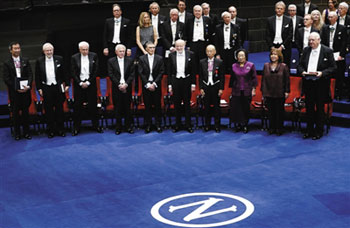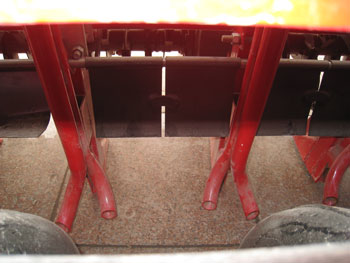It took 46 years to win the Nobel Prize.
After 46 years of persistence, she won the applause of the world.
Researcher Tu Youyou, a Nobel laureate

Ten 2015 Nobel laureates (front row) take a group photo at the end of the award ceremony at the Stockholm Concert Hall in the Swedish capital on December 10. Photo taken by Xinhua News Agency reporter Ye Pingfan
Chinese scientist Tu Youyou (left) receives the Nobel Prize in Physiology or Medicine from King Karl XVI Gustav of Sweden at the 2015 Nobel Prize ceremony held at the Stockholm Concert Hall in the Swedish capital on December 10.
Tu Youyou, a Chinese scientist, showed off her medals after the 2015 Nobel Prize ceremony. Tu Youyou won this year's Nobel Prize in Physiology or Medicine for her pioneering separation of artemisinin from Chinese herbal medicine for malaria treatment. This is the first time that Chinese scientists have won the Nobel Prize for scientific research carried out in China. It is the highest award so far received by the Chinese medical community, and it is also the highest award for the achievements of traditional Chinese medicine. Photo taken by Xinhua News Agency reporter Ye Pingfan
At 04:30 in the afternoon local time in Sweden, the eyes of the world began to "focus" at the Stockholm Concert Hall. When researcher Tu Youyou, a Chinese scientist in a purple dress, received the Nobel Medal and certificate from King Karl XVI Gustav of Sweden, the solemn venue applauded for a long time.
After 46 years of persistence, the 85-year-old man has won the respect of the world for China. Three days ago, when Tu Youyou attended a Nobel Prize in Physiology or Medicine Lecture held by Caroline Medical College, a Xinhua News Agency reporter filmed a touching scene: Mr. Jan Andersson, a professor of infectious diseases at Caroline Medical College, who was the host of the Nobel keynote lecture, had been kneeling on the ground during Tu Youyou's speech, holding the 85-year-old man with one hand from behind and holding the microphone for her with the other. Remained in this position for 30 minutes, motionless.
At the Nobel Prize winner's lecture, Tu Youyou, 85, still remembers the "battle" 46 years ago: in 1969, the Institute of traditional Chinese Medicine of the Academy of traditional Chinese Medicine participated in the national "523" project, and she was appointed as the leader of the research group. to undertake the research and development of antimalarial traditional Chinese medicine. After accepting the task, Tu Youyou began to collect and collate ancient books of traditional Chinese medicine, visited famous traditional Chinese medicine practitioners, and consulted a large number of folk prescriptions, and compiled a "single prescription collection of malaria" based on 640 kinds of Chinese herbal medicine. Tu Youyou said: "it is the collection and analysis of this information that lays the foundation for the discovery of artemisinin, which is where the research and development of new drugs of traditional Chinese medicine is different from that of general plant drugs."
Although there is such a collection of empirical prescriptions, it is difficult to screen out the drugs that are really effective against malaria from 640 drugs. Tu Youyou and her teammates once fell into the quagmire of research and could not find an ideal way out. Tu Youyou was also depressed in the face of setbacks. "I wondered if I was on the right path, but I didn't want to give up," she later recalled. " When she carefully read the literature of several drugs that showed signs of antimalarial in the Eastern Jin Dynasty, the description of "holding Artemisia annua with one liter of water, strangling the juice and taking it" in GE Hong's Elbow Emergency prescription in the Eastern Jin Dynasty gave her new enlightenment and took a key step in the successful extraction of artemisinin.
However, in the early 1970s, China was experiencing an unprecedented cultural revolution, and the scientific research work of most units was at a standstill, and there was no good experimental condition at all. Tu Youyou's colleague at that time, Jiang Tingliang, a researcher at the Institute of traditional Chinese Medicine of the Chinese Academy of traditional Chinese Medicine, told the Science and Technology Daily: "at that time, the laboratory did not even have basic ventilation facilities, but the task was very tight. Tu Youyou in order to speed up the purification speed, there is an urgent need to find suitable utensils that can hold a large number of solvents and experiments. However, the tight funding left them at their wits' end. Tu Youyou, who was in a hurry, thought of the tile jars used to pickle pickles at home, so she used them as utensils for purifying medicine. Finally, 100 grams of artemisinin crystals were successfully purified by these tile jars. However, Tu Youyou suffered from toxic hepatitis as a result of long-term exposure to such an environment, and other members also showed different symptoms of poisoning. "
But this did not shake Tu Youyou's determination. As soon as she got better, she hurried back to the laboratory to continue her scientific research. In order to get artemisinin to be used clinically as soon as possible, on the basis of animal safety evaluation, she and members of the research team took the extract of effective parts by themselves. When the clinical trial effect of artemisinin tablets was not satisfactory, they tried to use monomer capsules instead.
Recalling the experimental scene of Tu Youyou's research team, Jiang Tingliang said with emotion: "she has a persistent spirit that surpasses ordinary people." This is the most important quality of a scientist. " Jiang Tingliang revealed that before Artemisia annua, Tu Youyou also screened many substances. "for example, pepper, the laboratory's antimalarial results are quite excellent, with an inhibition rate of more than 90% of the malaria parasite, but it has no clinical effect. At the beginning of the experiment, the highest inhibition rate of Artemisia annua extract on malaria parasite was only 68%, and the lowest was only more than 10%, which was far less than that of pepper. Were it not for her persistence and persistence, the study of artemisinin would not have been successful. "
"persistence" is the most common word the reporter heard when interviewing Tu Youyou's colleagues to evaluate her. Relying on this persistence, Tu Youyou found Artemisia annua from ancient medical books and saved countless lives in the world with this seemingly ordinary grass. According to the World Health Organization (WHO), 3.3 billion people in 97 countries and regions around the world are still threatened by malaria, of which 1.2 billion live in high-risk areas. Statistics show that there were about 198 million malaria patients and 580000 deaths in the world in 2013. As the Nobel Committee pointed out, "artemisinin, a major discovery in the history of medical development, saves millions of lives of malaria patients around the world, especially in developing countries every year."
Although Tu Youyou, who won the award, has always kept a low profile and said little to the public and the media, at a media conference in Sweden, in response to the resistance of Plasmodium falciparum to artemisinin in the Greater Mekong region and a few parts of Africa, she cried out: the task of curbing artemisinin resistance is imminent!
Related
- A course of planting techniques and methods on how to grow carrots
- How to plant the latest tulips?
- Is it better to pick tea in the morning or in the afternoon? When is the best time for tea to be picked? what is the third or fifth tea?
- Launch Yuanxiao Happy combination Haocha + Tea Yuan healthy Taste
- Penghu Tourism "Fireworks 20 Parade with You"
- 2022 West Lake Happiness holds "Digital Revitalization Voucher" and draws iphone13 and laptop.
- Banqiao Fuzhou social houses are designed to change start-up combined with police elimination to create a safe and livable environment
- The convenient measure of "mechanical weeding" in Xinbei has been abused and the Agriculture Bureau has imposed heavy penalties on the illegal land consolidation.
- Changgeng University Joins Hands with Four Memory Factories to Rescue Memory Talent Shortage
- The list of Taiwan's top 100 MVP managers is listed by the Director-General of the Farmers' Association of Sanxia District.



